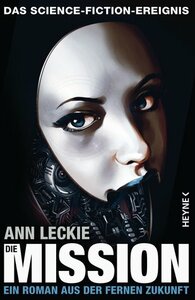You need to sign in or sign up before continuing.
Take a photo of a barcode or cover
What happens when you concatenate something that had taken place over thousands of years across a galaxy into a short hop through a space gate and a visitation to a space station and a planet which practices slavery in all but name? You have Ancillary Sword, the compact second instalment of the Imperial Radch trilogy. Now Ann Leckie is wasting no time, and she’s straight to business: one way or another, the Radch must go.
Almost immediately after the events of Ancillary Justice, ship-turned-humanoid Breq is given command of Mercy of Kalr, a Mercy class ship with a crew conditioned to act as ancillaries. With Seivarden as one of her ranking crew members and “baby lieutenant” Tisarwat on board, Breq sets a course for Athoek Station, where the sister of an old colleague lives … only to find more sectarian intrigue and throwback colonialist politics than any of them bargained for.
Ancillary Sword carries over themes and characters from Ancillary Justice without ever feeling like more of the same, or that old situations have been ported over to new planets. Leckie has presented new cultures separate to any the reader has seen before, thus perfectly underlying her point: the homogeneity enforced by colonisation and assimilation is both futile and a lie. For simplicity’s sake, science fiction often treats entire alien planets as monocultural, with a centralised government and a single language and way of thought. Ancillary Sword posits that an invading force steamrolls occupied populations into an amorphous blob, and that perhaps there are individual voices being smothered to provide the illusion of that whole.
There are multiple politics at play here and, again, the single pronoun applied to all subjects of the Radch, is the least interesting of them. Leckie paints on a canvas simultaneously broader and more specific: it is no coincidence that Ancillary Sword is set largely in the orbit of a planet designated as a tea plantation. No longer content to raise one population above another to foster resentment and distract from the truer enemy, Athoek has imported dissidents from another system to work the tea, and claims that they can raise themselves out of indentured servitude if they only had the gumption — and it’s not the Radch’s fault that none of these citizens have boots, let alone bootstraps. They’re just “lazy”.
It’s not exactly subtle, but it doesn’t have to be. That is the beauty and the curse of science-fiction and fantasy: you can absorb the story without absorbing the ideas behind it. Ancillary Sword is a story which features a gun that can pierce any material, an orbital lake separated from the vacuum of space solely by unnervingly thin glass, space travel via dimensional pockets, and the spread of omniscient consciousness, so it rollicks regardless.
Breq continues to be a remarkable character, often considering herself “angry” when she sounds reasonable in the face of the multiple injustices that she feels compelled to correct. As the only entity bothered to understand cultural relativism across the entire empire that she has grown to loathe, she is uniquely qualified to handle the issues to hand. She is never presented as a character with a saviour complex, but someone with an unerring sense of right and wrong; this concrete certainty of purpose and intent is, admittedly, more interesting in an immovable villain, but Breq has little time for ambiguity at this point in her career.
The secret, again, is the support cast. Breq fancies herself a loner but Leckie shines when she shows how her narrator works in a unit with the formerly loathsome Seivarden and Mercy of Kalr herself. The connection with a new ship allows Leckie to reintegrate the omniscient narrative that only Ancillary Justice’s flashbacks boasted, and though Mercy of Kalr is more of a feeling than a communicative character, she adds distinct textures to the book. The treatment of Tisarwat by both the character of Breq and the narrative itself is also genuinely a fascinating arc, touching on issues of identity that are only possible in a story such as this one. It is this ensemble that ultimately brings Ancillary Sword home, Leckie’s character work should not be underestimated.
With heavy politicking, multiple curious and discrete locations, and a self-contained story that connects a trilogy’s opening and closing acts without reading like a bridge, Ancillary Sword is a fitting follow up to Ancillary Justice. Breq is an all-time protagonist, and Leckie knows precisely who to pit her with and against to make for compelling science-fiction that provokes on philosophical and practical levels alike.
Reread, 2022: A very different book than Justice, and the changes are almost disappointing--because where the first book is highly constructed, this is a series of crises and their resolutions. The events turn out to be interconnected, but there's not a lot of character agency in those connections. But the what it does do, and well, is develop the setting and the cast. The series has a huge concept and scale, and I love it; but it's sold by its interpersonal relationships, by Breq's sense of self and social bonds. This is effectively the first of a duology about making those bonds a dynamic lived experience rather than a tragic backstory, in a way that doesn't undermine but rather enriches said backstory.
Original review, 2016: Breq is sent to Athoek Station, home to Lieutenant Awn's sister, to stabilize the region while public war breaks across Radchaai space. The plot here is a strange beast: the politics of Athoek's annexation are simultaneously heavyhanded and morally gray--like Radchaai's agender society, the issue of cultural discrimination isn't superbly handled but it is well intended, and I would rather it be there than not. The sense of place, politicking, and personal motivations knit well; foreshadowing to plot twists, however, is emphasized in a way that makes resolutions talky and transparent.
But while the plot's quality is uneven, the true focus is interpersonal. Leckie's antagonists/political conservatives--often the same thing--can be caricatured, but her sympathetic characters are superb, prickly and complex and beautifully drawn. And Breq, as a multi-instanced AI made singular, continues to be singularly phenomenal, a unique concept explored with conviction and insight. The emotional punch of this book should not to be underestimated. Ancillary Sword has its flaws and I just don't care--it's so rewarding to read.
Original review, 2016: Breq is sent to Athoek Station, home to Lieutenant Awn's sister, to stabilize the region while public war breaks across Radchaai space. The plot here is a strange beast: the politics of Athoek's annexation are simultaneously heavyhanded and morally gray--like Radchaai's agender society, the issue of cultural discrimination isn't superbly handled but it is well intended, and I would rather it be there than not. The sense of place, politicking, and personal motivations knit well; foreshadowing to plot twists, however, is emphasized in a way that makes resolutions talky and transparent.
But while the plot's quality is uneven, the true focus is interpersonal. Leckie's antagonists/political conservatives--often the same thing--can be caricatured, but her sympathetic characters are superb, prickly and complex and beautifully drawn. And Breq, as a multi-instanced AI made singular, continues to be singularly phenomenal, a unique concept explored with conviction and insight. The emotional punch of this book should not to be underestimated. Ancillary Sword has its flaws and I just don't care--it's so rewarding to read.
adventurous
mysterious
tense
medium-paced
Plot or Character Driven:
Plot
Strong character development:
No
Loveable characters:
Complicated
Diverse cast of characters:
Yes
Flaws of characters a main focus:
Complicated
adventurous
challenging
dark
mysterious
medium-paced
Plot or Character Driven:
Character
Strong character development:
Yes
Loveable characters:
Complicated
Diverse cast of characters:
Yes
Flaws of characters a main focus:
Yes
The best thing about this book series is it's getting me back to reading the infinitely better [b:Five Ways to Forgiveness|36366224|Five Ways to Forgiveness|Ursula K. Le Guin|https://i.gr-assets.com/images/S/compressed.photo.goodreads.com/books/1507334037l/36366224._SY75_.jpg|86175230]. I was slowed by finding time to read actual print text, but I took an hour to read the third novella in the collection because the comparisons to Le Guin are driving me crazy. Fortunately, I now know why I enjoy Le Guin, but find Leckie incredibly tedious. Le Guin manages to combine her characters' search for meaning and show how their search is affected by meaningful events. This book has Breq trying to find absolution the deaths in her past by getting forgiveness for one of them. She is also ostensibly trying to find and kill the evil Lord of the Radch whose influence may be in the area, though this plot is basically ignored for the whole book. She is also finding a new family? Sort of. I dunno, that happens anyway. She also is trying to figure out what's beyond a ghost portal, help a bunch of misplaced people, and fight for immigrant worker's rights. These are actually brought together in the next novel, though only in a basic plot way. The Ancillary series missing thematic coherence. Usually, there are a few themes that run through a novel, and often they complement each other. This is all over the place, and I wonder if it's because it just spends its whole time setting up the next novel.
I enjoyed this more that the first book because I understood the world it takes place in. It's a complicated one, and Ann Leckie has done a great job in portraying AIs.
I think I might be repeating myself too much if I wrote a review of this book from scratch—much of how I feel ab0ut it can be found in my review of [b:Ancillary Justice|17333324|Ancillary Justice (Imperial Radch, #1)|Ann Leckie|https://d.gr-assets.com/books/1397215917s/17333324.jpg|24064628], the first volume in the series. This book continues the story of our favorite ancillary, Breq, now Fleet Captain and in a territory with...issues.
One of the things I like best in these books (as in most of the finest SF, in my opinion) is the way in which the author takes on moral, ethical, and social challenges that mirror those we are facing every day. She has such a clever way of introducing ideas of gender, sex, race, justice, and class that you don't even know you are being schooled until the medicine has already gone down.
Unlike in the previous book, I felt that Leckie hits her stride here, and her handling of these delicate subjects has much more depth and complexity than before, which also leads to a much more satisfying read. Don't get me wrong, I loved the first book, but was very pleased to see that she had moved further in the direction of complexity and ambiguity in her analysis of the relationships into we humans twist ourselves.
In case you are not familiar with the outlines of the universe these books inhabits, a little taste: this is a vast place, with many planetary systems and thousands of cultures. Over many centuries, most of these have been co-opted by the Imperial Radch, an expansionist empire led for all of its 3000-plus years by the ubiquitous Anaander Manaai. And this co-option takes forms that, at best, push the boundaries of moral, ethical warfare and government. Some of the occupants of this universe are ancillaries of artificial intelligence beings, meaning they are the human avatars of space ships and other entities. The empire is inexorable and the rule of the emperor absolute and irresistible...until it isn't.
It is a fascinating series, and I look forward to beginning the third (and last) book in it. Quite a wonderful read; give it a shot!
One of the things I like best in these books (as in most of the finest SF, in my opinion) is the way in which the author takes on moral, ethical, and social challenges that mirror those we are facing every day. She has such a clever way of introducing ideas of gender, sex, race, justice, and class that you don't even know you are being schooled until the medicine has already gone down.
Unlike in the previous book, I felt that Leckie hits her stride here, and her handling of these delicate subjects has much more depth and complexity than before, which also leads to a much more satisfying read. Don't get me wrong, I loved the first book, but was very pleased to see that she had moved further in the direction of complexity and ambiguity in her analysis of the relationships into we humans twist ourselves.
In case you are not familiar with the outlines of the universe these books inhabits, a little taste: this is a vast place, with many planetary systems and thousands of cultures. Over many centuries, most of these have been co-opted by the Imperial Radch, an expansionist empire led for all of its 3000-plus years by the ubiquitous Anaander Manaai. And this co-option takes forms that, at best, push the boundaries of moral, ethical warfare and government. Some of the occupants of this universe are ancillaries of artificial intelligence beings, meaning they are the human avatars of space ships and other entities. The empire is inexorable and the rule of the emperor absolute and irresistible...until it isn't.
It is a fascinating series, and I look forward to beginning the third (and last) book in it. Quite a wonderful read; give it a shot!
A different pace to the first one in the series but very good. I am enjoyed the use, or lack of, of gender and the exploration of AI. Worth your time, especially scifi fans.
adventurous
emotional
funny
inspiring
mysterious
sad
tense
medium-paced
Plot or Character Driven:
A mix
Strong character development:
Yes
Loveable characters:
Yes
Diverse cast of characters:
Yes
Flaws of characters a main focus:
Yes
4.5 stars. These books are best read back-to-back because of the mindshift this series requires.



